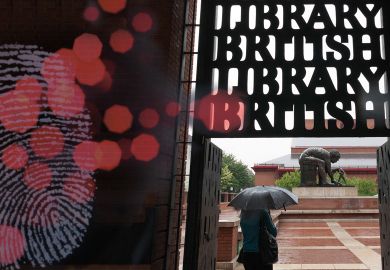“A library is the university’s heart”, Essex University’s first vice-chancellor Albert Sloman memorably argued in a 1963 BBC Reith Lecture on how his new “university town” would operate.
That position is truer than ever in this age of 24/7 opening hours, laptop-carrying undergraduates and near-instant journal access, but the university library – like most areas of academic life in this climate of institutional cuts – is expected to find savings. That comes despite university libraries already slashing an estimated £51 million from their budgets this year, according to a recent analysis by the Society for College, National and University Libraries.
These upcoming savings rounds will hit library collections budgets first and foremost. That will mean we cannot act like a library of record or keep up with the exploding rates of scholarly journals and articles being published. A different approach is needed.
In practice, this will mean revisiting some of the read-and-publish deals with large publishers that have helped us deliver digital content at scale for our staff and students. These agreements have proved to be useful, providing choice and allowing for wide-scale open-access publishing. But now we have to decide whether these are something we can keep at all.
Indeed, the option might not be there anyway – going into its year of negotiations with the “Big 5” Jisc has reported that these deals are unsustainable in their current form, and several university libraries are already pulling away from Elsevier. The model of subscribing to nearly everything a publisher provides, including journals we might not read and titles we might not publish in, certainly feels like it is a luxurious proposition designed for a very different time.
The same is true of committing to e-textbook deals where we have great choice, but must pay for either the same or very similar content year-on-year. Textbooks unquestionably provide opportunities for students to enrich their learning, but expensive deals with locked-in fees are not models we can engage with any more.
Going back to banks of hard copy textbooks on library shelves is not an option either though, as it would mean reversing our “digital first” approach, which ensures equitable, anytime access for our users, who are based across three different campuses and more widely around the world.
Open textbooks increasingly look like a key part of the solution for libraries. By utilising high-quality sources of freely available content, we can not only reduce costs associated with commercial e-textbooks, but facilitate more fluid and interactive learning experiences for learners. A case study from Coventry University and its work with an AI tool has had a lot of librarians talking, and across the sector discussions about replacing textbooks on reading lists have started in earnest.
Our view, then, needs to be to provide “collections as a service”. Here, collections are just one service among many that we have cultivated, such as in research support, reading lists and academic liaison. At Essex, we’ve been using a content supply model for about five years as opposed to collection building, but with the recent big shocks to higher education the position is evolving from “big content” to “choice content”.
Now all of our subscriptions must prove they have healthy usage levels and are valued by more than just a handful of researchers and students.
Personally, I feel we are becoming more of an “access broker” than a kind of repository in the Library of Alexandria image. We must find cost-effective ways to deliver content and services, even if that content isn’t always owned by us and doesn’t meet our users’ prior expectations. If need be, libraries must adapt and think about themselves as a middleman or a facilitator in the information discovery process, rather than being the end point or the solution.
Our academics are being asked to go through a mindset shift where interlibrary loan is the alternative to a niche journal subscription, and green open access through rights retention is sometimes the alternative to an article processing charge (APC) in an academic journal. We still ensure compliance with the Research Excellence Framework 2029 open-access rules this way, and APCs can be used in specific and strategic instances. Buttressing all this is “post-cancellation access” whereby in most cases we can retain access to the content we bought with our subscriptions previously.
In short, we no longer have money to invest in solutions that don’t bring back strong value, but will find ways to disseminate your work or get you that essential book or paper eventually.
How academics have received this news has varied. Colleagues express understanding and can relate to the need for change, but they maintain that there is definite line in the sand, and by going too far these changes will stop academics being able to do their jobs in delivering education and doing world-class research. This is a line we are keen not to cross.
At the same time, we want to invest in infrastructure which is sustainable for our needs, such as open educational resources and diamond open-access publishing. We run The Essex Student Journal which uses a diamond open-access model (free to read, free to publish), and want to keep making transformative contributions to students’ experience and the institution’s research culture like this. Of course, when budget savings are achieved, we need to be able to keep part of the saving to reinvest and make this happen.
The idea is to get on the front foot so that universities won’t be left with library services that are hollowed out or inadequate for supporting education and research. That’s our plan at Essex, and that’s how we want to come out of this challenging period.
Liam Bullingham is assistant director (academic and research services) at the University of Essex’s Library and Cultural Services.
Register to continue
Why register?
- Registration is free and only takes a moment
- Once registered, you can read 3 articles a month
- Sign up for our newsletter
Subscribe
Or subscribe for unlimited access to:
- Unlimited access to news, views, insights & reviews
- Digital editions
- Digital access to THE’s university and college rankings analysis
Already registered or a current subscriber?








